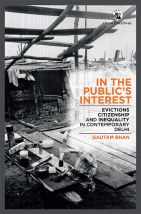In the Public’s Interest: Evictions, Citizenship and Inequality in Contemporary Delhi

In the Public’s Interest examines how evictions of informal settlers allow us to challenge, and therefore better understand, the dynamics of contemporary urbanism. The book stems from Gautam Bhan’s local research to quantify the impact of resettlement on evicted residents of Pushta, a basti (informal settlement) in central Delhi. Understanding the basti as a self-constructed urban form – and a particular form of urbanism – Bhan seeks to interpret the transformations that basti evictions signal. Furthermore, in focusing on Delhi, the book highlights the extreme end of trends to restructure Indian megacities through eviction.
Rooted in Southern urban theory and with the aim to contribute to a broader ethnography of inequality, this book follows six lines of inquiry:
1) understanding urban informality/illegality;
2) debates on “good governance”;
3) the political field of urban citizenship;
4) subaltern residents’ ability to resist and struggle against exclusion;
5) relationships between law and urbanism; and
6) the relationship between democracy and inequality.
The introduction explains the history of the Pashta evictions and details the six lines of inquiry identified above. It also outlines Bhan’s research methods.
Interrogating failures of planning in Chapter 1, “Planned Illegalities”, Bhan looks at the production of housing in the city and seeks answers by developing a history of inhabitation in Delhi (pages 46 and 47).
In Chapter 2, “Planned Development and/as Crisis”, Bhan argues that court-ordered evictions offer a unique opportunity to study urban governance and reveal further judicial efforts to make the city a “governable space”. As part of this chapter Bhan analyses 24 cases of public interest litigation that have resulted in evictions in Delhi (page 99).
Spatial illegality, urban citizenship and the challenges of inclusive politics are the focus of Chapter 3, entitled “Unmaking Citizens”. In this chapter Bhan looks at case law on evictions through the lens of what they reveal about the possibilities of urban citizenship in Indian cities (page 149).
Chapter 4, “You Can’t Just Walk into a Court”, then moves to consider what impact judicial orders on evictions have on the resistance within the basti and argues for what Bhan calls a “judicialisation of resistance” (page 191).
In the conclusion, Bhan returns to his fifth and sixth lines of inquiry as noted above to tie the previous chapter arguments together. He thus discusses inequality and the persistence of poverty followed by judicial urbanism.
This provocative book is specifically relevant for sociologists, geographers, and urban and development planners and practitioners.
Book note prepared by Hannah Keren Lee
Search the Book notes database
Our Book notes database contains details and summaries of all the publications included in Book notes since 1993 - with details on how to obtain/download.
Use the search form above, or visit the Book notes landing page for more options and latest content.
For a searchable database for papers in Environment and Urbanization, go to http://eau.sagepub.com/

